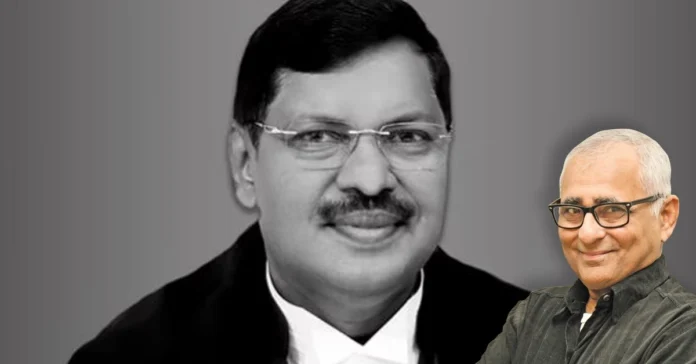By Inderjit Badhwar
The relationship between law and morality has always been uneasy, yet inseparable. Law is the instrument by which a society governs itself; morality is the compass by which it knows whether it should. This week’s cover story: When Law Meets Conscience: Gandhi, Ambedkar, and the Moral Compass of Justice by Binny Yadav arrives at a moment when that distinction feels more urgent than ever.
In his recent address in Mauritius, Chief Justice of India (CJI) BR Gavai offered a reminder that was at once simple and profound: “Just because something is legalised, it does not mean it is just.” That single sentence—clear, unadorned, and deeply moral—reopens a conversation that has run like a quiet current through India’s constitutional life: the dialogue between law and conscience, between Mahatma Gandhi’s ethics and BR Ambedkar’s rationalism.
For both thinkers, morality was never ornamental. For Gandhi, it was the lifeblood of resistance; for Ambedkar, the foundation of a just state. Gandhi’s insistence on the supremacy of conscience and Ambedkar’s invocation of constitutional morality were not opposing ideas, but complementary correctives — one reminding us that laws without compassion become cruelty, the other that morality without law dissolves into chaos.
Yadav’s story revisits that moral continuum through the prism of the modern judiciary. In tracing the line from Shayara Bano to Bilkis Bano, from Joseph Shine to Electoral Bonds, the narrative uncovers a pattern—the Supreme Court’s evolving willingness to privilege justice over mere legality. It is a subtle, but seismic shift: from procedural correctness to moral clarity. These are verdicts where the law has dared to feel.
Consider what these judgments represent collectively. The Shayara Bano ruling confronted patriarchal custom; Joseph Shine liberated gender from colonial morality; Navtej Johar restored dignity to love itself; and Bilkis Yakub Rasool reminded the nation that legal power, misused, is moral failure. Each of these decisions, in its own way, has expanded the moral imagination of the Republic. They mark a constitutional evolution—from protecting order to nurturing conscience.
CJI Gavai’s invocation of these cases, and his warning against mistaking legality for justice, carries a resonance beyond the courtroom. We are living in an age of accelerated legality—when statutes, executive orders, and majority mandates often move faster than ethical reflection. The law can codify power as easily as it can protect rights. That is precisely why Ambedkar insisted that the survival of democracy depends on constitutional morality—on citizens and institutions internalising restraint, empathy, and reason.
Our cover story also reminds us that legality, in itself, is morally neutral. Slavery was once legal; apartheid, too. Colonial laws criminalised love and dissent, while caste discrimination found tacit sanction in social law. What redeems a democracy is not its ability to make rules, but its willingness to examine those rules in the light of justice. That examination—uncomfortable, continuous, and self-critical—is what separates a living Republic from a merely lawful one.
The judiciary, in that sense, is not just an interpreter of statutes; it is the Republic’s conscience keeper. Its moral authority lies not in the finality of its decrees, but in the humanity of its reasoning. When the chief justice of India reminds us that justice must be moral, not mechanical, he is reclaiming the judiciary’s oldest and most sacred role: to be the final custodian of fairness.
Yet, this conversation cannot remain confined to the courts. It must extend into our collective civic life— into the way we legislate, debate, and dissent. Gandhi’s “court of conscience” and Ambedkar’s “constitutional morality” are not abstract ideals. They are living tests of our social maturity. They ask: Are we a society that merely obeys the law, or one that understands why a law deserves obedience?
In a time when majoritarian sentiment often masquerades as moral authority, when legality risks becoming a mask for inequity, this question becomes existential. The Republic’s health depends not just on how well it is governed, but on how deeply it listens to its conscience.
As an editor, I see in Yadav’s story both a reflection and a challenge. It reflects the judiciary’s growing sensitivity to human dignity, and it challenges us—as citizens, journalists, lawmakers—to look beyond the letter of the law to its spirit. Because laws are not made of words alone. They are animated by the values we pour into them.
Gandhi believed that no state can survive without moral authority; Ambedkar believed that no morality can survive without institutional discipline. Between these two truths lies India’s constitutional journey—imperfect, evolving, but profoundly alive.
That journey continues every time a judgment expands freedom rather than narrows it, every time the court insists that justice is more than compliance. It continues in every citizen who still believes that legality is not the end of justice—only its beginning.
In that sense, this week’s cover is more than reportage. It is a reminder of what must endure when all else changes: the Republic’s conscience.


